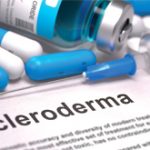Colon Involvement
Dr. Clarke said that constipation is his most challenging scleroderma-related symptom to treat. “These patients tend to have proximal symptoms, so asking them to increase bulk tends to just worsen the gastroparesis,” he said.
Lubiprostone, the first approved medication, increases fluid secretion from chloride channels in the colon and small bowel. There is also linaclotide, which was approved several months ago. It increases fluid secretion, and Phase III trials found that it might also reduce abdominal pain—so, at least on paper, it “looks like there might be something that works particularly well for these patients,” he said.
Dr. Clarke is encouraged about prucalopride, which seems to have a “more colon-specific role,” he notes. It has been approved in Europe, but not in the U.S.
Fecal Incontinence
This is a surprisingly common but underreported problem, Dr. Clarke said. Lifestyle changes can be made to increase bulk in the stool to soak up fluids, but that approach can be difficult. Physical retraining to increase sphincter tone is another option. Also, over the last two years, two therapies have been FDA approved: the first injectable drug that can be used to bulk up the sphincter area (Solesta) and sacral nerve stimulation, in which electrical impulses are sent to the nerves that regulate the sphincter muscle.
Thomas Collins is a freelance medical journalist based in Florida.



